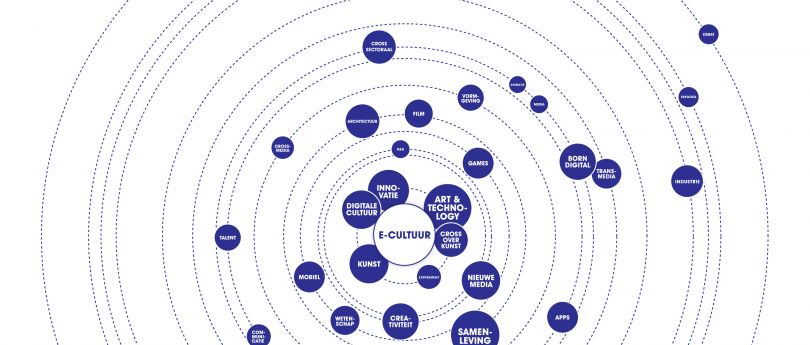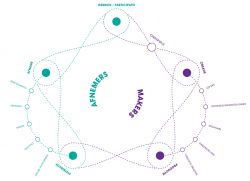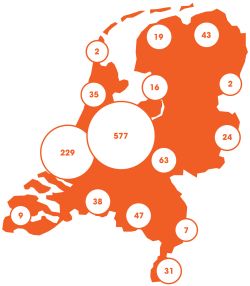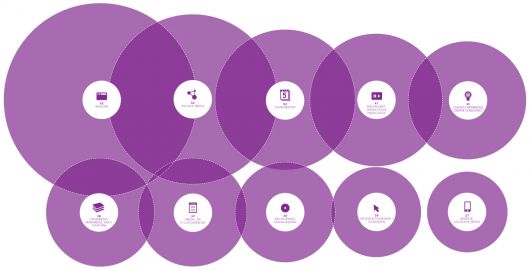English /
What is e-culture?

Feiten en Cijfers: E-cultuur universum
E-culture is a policy term used to describe the ever shifting relationship between new information and communication technology and the production and consumption of culture and the arts. The term e-culture is used in Dutch cultural policy documents to refer to the relationship between new media and culture.
Digital media have become an integral part of the consumption and production of culture in the last ten years. These developments are the basis of a new, innovative e-culture sector. Some examples of e-culture products and services include smart phone apps for museums, AR apps for architecture in the public space, but also tools developed for other sectors such as education or health care.
The Netherlands Ministry of Education, Culture and Science appointed Virtueel Platform as sector institute for e-culture in 2007. A number of cultural organisations receive structural funding from the Ministry in the category e-culture. In addition a large number of other organisations and individuals develop products and services, or carry out (artistic) research in the field.
Sector
analysis: e-culture in the Netherlands
The
first sector analysis was carried out in 2011. It confirms the key
role that digital media plays in the Dutch cultural sector. More than
1400 organisations, individual makers and companies work in the
sector, with a gross annual turnover of some 400 million euros.
- Sectoranalysis 2011 - UNESCO value chain
E-culture is a relatively young sector compared with other arts disciplines and research fields. The first e-cultural experiments in the Netherlands started around twenty years ago. In a very short time it has become a sector of its own, and part of the UNESCO cultural value chain.
The e-culture value chain is made up of artists, inventors and researchers working as freelancers or for e-culture organisations, media labs, game makers or creative companies. Among their most important clients are museums, theatres, companies, health care, education and other institutions in the social sector. The products and services include websites, apps, art works and games. Not forgetting the 'users' of these products and services. In addition there are more than 25 media arts related further education programmes providing fresh talent for the sector, and (media) festivals, online platforms and other forms of distribution of these products and services.
E-culture
in Dutch society
In
Dutch society at large e-culture works on two levels. First, in terms
of the e-culture field of artists, designers, inventors and
researchers, who make arts, knowledge, software, games, new
communication formats and instruments. In this sense the sector
provides a space for free innovation, experiment and sometimes
disruption. There are may opportunities for these products and
services to be developed further in to socially and/or economically
valuable products.
- Sectoranalysis 2011 - E-culture map
The second level relates to the importance of innovation in the way we live together as citizens and new ideas about improving the networked world we live in. A society in which technology is pervasive inherent requires new concepts and ideologies that can analyse, challenge and direct developments as they happen. The e-culture sector is an important field that fosters new ways of looking at the world in a critical manner. This also has a broader socio-economic value.
History
The
term e-culture was adopted in the Netherlands in April 2002 in a
policy paper by the Ministry of Education, Culture and Science.
(LINK)
In 2003 the Council for the Arts published an advisory report to the
Dutch government entitled “From ICT to Eculture”.
The report underlined that digitalisation affects the entire spectrum of culture production distribution, representation. The Internet and digital media have an impact on how artists express themselves; how our cultural heritage is presented; how libraries make information accessible to the public; and how information, public debate and culture is treated within media. e-Culture, was taken to mean all processes of “expression, reflection and sharing in the digital domain”.
The
policy perspective on e-culture developed in the Dutch advisory
report was based on three
lines of argument:
- One, that in a network society, where experiences and developments are increasingly defined by (digital) media technologies, the cultural sector —and indeed our idea of ‘culture’— must be re-cast in that very context.
- Second, that in the new arena of e-culture, policies for the arts, libraries and cultural heritage institutions and for public media broadcasting can no longer be developed in separation. Put differently, what was called for is an integrated cultural policy perspective.
- And third, that e-culture goes well beyond the instrumental application of information technologies in the field of arts, museums, libraries and broadcasting. It involves both cultural innovation and changing roles for cultural institutions in the context of the digitalisation society.
In this manner, the Dutch perspective on e-culture moved the discussion from the instrumental use of ICT, to a fundamental re-think of cultural activities in the digital domain. Virtueel Platform also adopted the term e-culture, for example in the 1999 publication 'E-culture: cultural policy for innovation'. In the mid 1990s it was used in two contexts, firstly at European level in relation to digital heritage preservation, and also in the sense of a contrast to e-commerce.
In the course of the 1990s e-culture was increasingly used in policy circles, and not just in the Netherlands. The Flemish publication E-cultuur: bouwstenen voor praktijk en beleid' (literally: E-culture, building bricks for practice and policy') was published in 2007.
June 2007 saw the publication of the four-yearly arts plan entitled 'Kunst van Leven', which picked 'innovation and e-culture' as one of the 5 key policy areas for Dutch culture. The same document designated Virtueel Platform as a 'sector institute'.
- Sectoranalysis 2011 - Products and services



